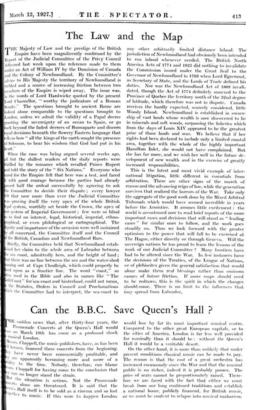The Law and the Map T HE Majesty of Law and
the prestige of the British Empire have been magnificently confirmed by the Report of the Judicial Committee of the Privy Council :lelivcred last Week upon the reference made to them under an Act of William IV by the Dominion of Canada and the Colony of Newfoundland. By the Conimittee's 'dyke to His Majestythe territory of Newfoundland is trebled and a source of increasing friction between two members of the Empire is wiped away. The issue was, in the words of Lord Hard wicke quoted by the present ,ord Chancellor, "Worthy the judicature of a Roman mate." The questions brought to 'ancient Rome are indeed alone comparable to the questions brought to .ondon, unless we admit the validity of a Papal decree granting the sovereignty of an ocean to Spain, or go sick beyond the faded decrees of Buonaparte and discern val decisions beneath -the flowery Eastern language that ells us how" all the kings of the earth sought-the presence f Solomon, to hear his wisdom that God had put in his wart."
When the -case was being argued several weeks ago, I but the dullest readers of the daily reports were killed by the romance which recalled Prince Rupert id told the -story of the "Six NatiOns." Everyone who 'wed for the Empire felt that here Was a test, and faced I with good courage because the parties had already assed half the ordeal successfully by agreeing to ask he Comniittee to decide their dispute ; every lawyer elt that now more than ever the Judicial Committee as proving itself the very apex of the whole British egal system, worthily set beside the Crown, the apex of ur system of Imperial Government ; few were so blind s to find no interest, legal, .historical, imperial, ethno- aphical, or even Philological or cartographical. The • ignity and importance of the occasion were well sustained v all concerned, the Committee itself and the Council f die British, Canadian and Newfoundland Bars.
Briefly, the Committee held that Newfoundland estab- shed her claim to the whole area of Labrador between e sea coast, admittedly hers, and the height of land ; at there was no line between the sea and the water-shed ming out at Cape Chudleigh, which could properly he -ed upon as a frontier line. The word "coast," so ten used in the Bible and also in names like ." The old Coast" for.sea-coast and hinterland, could not mean, the Statutes, Orders- in Council and Proclamations lieh the Committee had to interpret, the sea-coast to any other arbitrarily limited distance inland. The jurisdiction of Newfoundland had obviously been intended to run inland whenever needed. The British North America Acts of 1774 and 1825 did nothing to invalidate the Commission issued under the Great Seal to the Governor of Newfoundland in 1763 when Lord Egremont, as Secretary of State, and the Lords of Trade defined his duties. Nor was the Newfoundland Act of 1809 invali- dated, though the Act of 1774 definitely annexed to the Province of Quebec the territory south of the 52nd degree of latitude, which therefore was not in dispute. Canada receives the hardly expected, scarcely considered, little Woody Island. Newfoundland is established in owner- ship of vast lands whose wealth is now discovered to lie in minerals and soft woods, surpassing the fisheries which from the days of Louis XIV appeared to be the greatest prize of those lands and seas. We believe that if her rights had been declared to include only a limited coastal area, together with the whole of the highly important Hamilton Inlet, she would not have complained. But she has far more, and we wish her well in the future de- velopment of new wealth and inn the exercise of greatly increased responsibilities.
This is the latest and most vivid example of inter- national litigation, little different in essentials from arbitration. There are other signs of the march of reason and the advancing reign of law, while the generation survives that realized the horrors of the War. Take only the aggregate of the good work done by the Mixed Arbitral Tribunals which would have seemed incredible in years before the 'Armistice. It arouses little excitement : the world is accustomed now to read brief reports of the more important eases and decisions that will stand as " leading eases" for similar ones to follow, and the work goes steadily on. Thus we look forward with the greater optimism to the power that will fall to be exercised at The Hague, either directly or through Geneva. Will the sovereign nations be too proud to learn the lessons of the work of our Judicial Committee ? Many frontiers have had to be altered since the War. In few instances have the decisions of the Treaties, of the League of Nations, or of plebiscites given the general satisfaction that would alone make them real blessings rather than ominous causes of future friction.. If more maps should need to be redrawn, this is the spirit in which the changes should come. There is no limit to the influences that may spread from Labrador.






























































 Previous page
Previous page